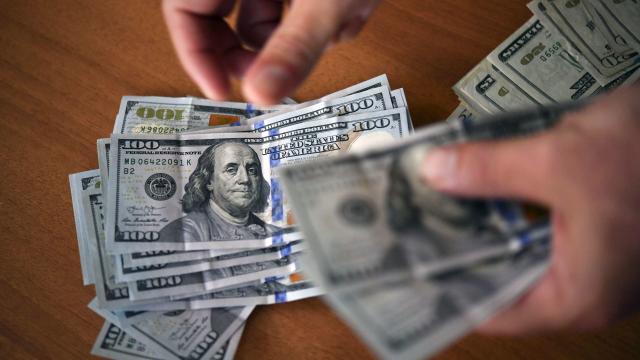A new ProPublica report out December 20 confirms what many people already suspect about Big Pharma’s influence on health care: Doctors who get money from a pharmaceutical company related to a specific brand name drug are more likely to prescribe that same, often expensive drug to their patients.
It’s no secret that pharmaceutical companies spend plenty of money on doctors and scientists—upwards of over a billion dollars annually in the U.S. This money can range from offering doctors free pens and dinners to paying them to give talks at sponsored conferences and events. And there’s been steady evidence these payments can subtly influence how doctors behave, both in their interactions with patients and in the research they carry out.
[referenced url=”https://gizmodo.com.au/2019/12/what-is-the-pharmacy-guild-of-australia-and-why-does-it-wield-so-much-power/” thumb=”https://gizmodo.com.au/wp-content/uploads/2019/12/Screen-Shot-2019-12-02-at-9.47.16-am-410×231.png” title=”What Is The Pharmacy Guild Of Australia And Why Does It Wield So Much Power?” excerpt=”Across Australia around 5,700 community pharmacies are responsible for dispensing the majority of prescriptions subsidised under the Pharmaceutical Benefits Scheme (PBS).”]
A 2016 report by ProPublica, for instance, found that the more doctors were paid by the industry, the more they prescribed brand name drugs in general. Other research has found that this increased brand name prescribing happens even when doctors are given a free meal worth less than $US20 ($29). But according to the author of this latest report, Hannah Fresques, what’s been missing is a comprehensive analysis of the practice on an individual drug level.
“We specifically drilled down to see which drugs were promoted in each interaction that our records provided evidence of,” Fresques told Gizmodo by phone.
Fresques and others used data from the Open Payments program, a project started in 2014 to track industry payments made to doctors and teaching hospitals by companies that sell drugs and medical products covered by federally provided insurance plans like the U.S. version of Medicare. They then cross-referenced this information with prescription data from doctors who had billed Medicare’s Part D prescription drug program in 2016.
Across 50 of the most commonly prescribed brand name drugs that year, they found the same pattern. For instance, when doctors got payments related to a drug used to treat irritable bowel syndrome called Linzess from the drug’s makers, Allergan and Ironwood, they were 45 per cent more likely to prescribe the drug on average than non-funded doctors. The same relationship was true for 46 out of 50 drugs, with prescription rates on average 58 per cent higher for industry-funded doctors. And 38 of the 50 drugs cost more than $US1,000 ($1,450) a year per patient.
Other popular drugs included the opioid pain medication Oxycontin, the high cholesterol drug Crestor, and the anti-blood clotting drug Xarelto.
The companies, lobbyists, and funded doctors interviewed by Fresques were defensive about the findings.
“I’m more educated towards the drug, because I have to be trained to speak on it, so I’m more comfortable prescribing it,” Huey Nguyen, a gastroenterologist in southern Indiana who had received over $US7,000 ($10,147) between 2013 to 2018 as a promotional speaker for Linzess, told ProPublica. And while denying that the financial relationship he had with Allergan and other companies had influenced his care for patients, he added that it was “perfectly reasonable for people to question my motives.”
“Even if doctors themselves would say that this isn’t affecting their judgment, there’s research showing that it’s possible it does. The other worry is that it erodes trust between patients and doctors.” Fresques said. “I think a lot of patients don’t know that these kind of activities take place, and it’s valuable information to have.”
The report wasn’t intended to find out whether these payments have had any particular negative effect on patients’ health. Fresques does note, though, that Medicare Part D could have saved nearly $US3 ($4) billion in 2016 if it had only paid for the available generic versions of brand name drugs. And according to Nicholas Evans, a bioethicist at the University of Massachusetts Lowell, it’s clear that the practice has a pernicious effect on medicine as a whole.
“We don’t know, for sure, in all cases, if this is connected to worse healthcare and health outcomes. What we can say is that this is a component of the larger injustice that is American healthcare,” Evans told Gizmodo in an email. “If it is true that this is how doctors receive information about new drugs and guidance on prescribing, that’s horrible, because what we’re saying is that the marketplace for new medical knowledge is just that: one in which knowledge about drugs is governed by who can pay to promote their product. That’s no way to run a health system. It’s a way to make money, and not much else.”
Moreover, he said, the report should serve as a reminder that swaying doctors through free dinners is just one example of how the pharmaceutical industry squeezes profit at the expense of patients. And they’ll stop at nothing to keep it that way.
“The kinds of reform we’re talking about right now—the various plans lumped into ‘Medicare For All’—would take away some of the power pharmaceutical companies have to dictate prescriptions via promotional materials,” he said. “That, in my mind, is a good thing, because medicine should be governed by evidence, not marketing. But pharmaceutical companies and their industry lobbying groups will oppose this because it goes against their bottom line by limiting the ways they can affect prescriber behaviour.”
[referenced url=”https://gizmodo.com.au/2019/11/its-time-to-kick-big-pharma-out-of-antibiotics-research-scientists-argue/” thumb=”https://i.kinja-img.com/gawker-media/image/upload/t_ku-large/bnavnswuy3g86f9n0une.jpg” title=”It’s Time To Kick Big Pharma Out Of Antibiotics Research, Scientists Argue” excerpt=”In the wake of recent reports showing that antibiotic-resistant superbugs are on the rise, some scientists in the UK are pushing for a fix that might seem radical. They argue that the research and development of new antibiotics should be taken out of the pharmaceutical industry’s hands and publicly funded on a global scale.”]
